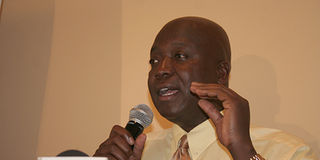New team set up to probe shilling drop

Gem MP Jakoyo Midiwo. Photo/FILE
Parliament has set up an 18-member committee to investigate the decline of the shilling.
The team, that includes five members of the Finance, Planning and Trade committee, will recommend rescue measures within six months.
Last week there was a deadlock in the House when the Finance team opposed the formation of the select committee, saying it was already dealing with the issue.
Nation of cartels
But on Wednesday, Gem MP Jakoyo Midiwo said the standoff had been resolved after the Finance committee chaired by Nambale MP Chris Okemo (ODM) agreed with the mover of the motion, Mr Aden Keynan (Wajir West, Kanu), to have three more members of the Finance committee join the select team.
Mr Keynan did not object and Mr Okemo moved an amendment to include himself, his deputy Prof Philip Kaloki and Mr Midiwo.
The three join Mr Shakeel Shabir and Mr Martin Ogindo in the select committee.
Other members of the committee are MPs Keynan, Charles Kilonzo, Benjamin Langat, Peter Kiilu, Moses Lesonet, Emilio Kathuri, Benedict Gunda, Rachael Shebesh, Shakila Abdalla, Noitha M’Mithiaru, Martin Ogindo, Yusuf Chanzu, Erastus Mureithi, Abdul Bahari and Adan Duale.
Mr Keynan said Kenya was slowly sliding into a nation of cartels, especially in the sugar and oil sectors.
“Maize and foreign currency cartels have surfaced and we must protect the interests of 40 million Kenyans. The House will ensure that it provides solutions to save the economy,” he said.
Ol Kalou MP Erastus Mureithi said the falling shilling is not a new phenomenon as it happened in the 1990s when Treasury Bills rose by 82 per cent and interest rates by over 50 per cent.
He said banks started investing more in Treasury Bills than lending to businesses, pushing up inflation.
Mr Mureithi, who was then in the banking industry, said this resulted in bad and doubtful debts.
Injection of funds
He said after 2003, the government started rescuing collapsing institutions through injection of funds and writing off bad debts.
This, he proposed, must be done now due to inflation.
“The Central Bank’s increase in interest rates will see people move to invest in Treasury Bills again. Inflation and the cost of living must be brought down for banks to lend to ordinary Kenyans,” he said.
He further said there was a need to mop up excess money in circulation, adding that the committee should not reinvent the wheel but look at what was done to salvage the falling shilling in the 1990s.
“We are not looking at any tribal or political issue here. It is about the poor Kenyan who cannot afford basic commodities. We must do something out of the box to resuscitate the economy,” said Mr Mureithi.




